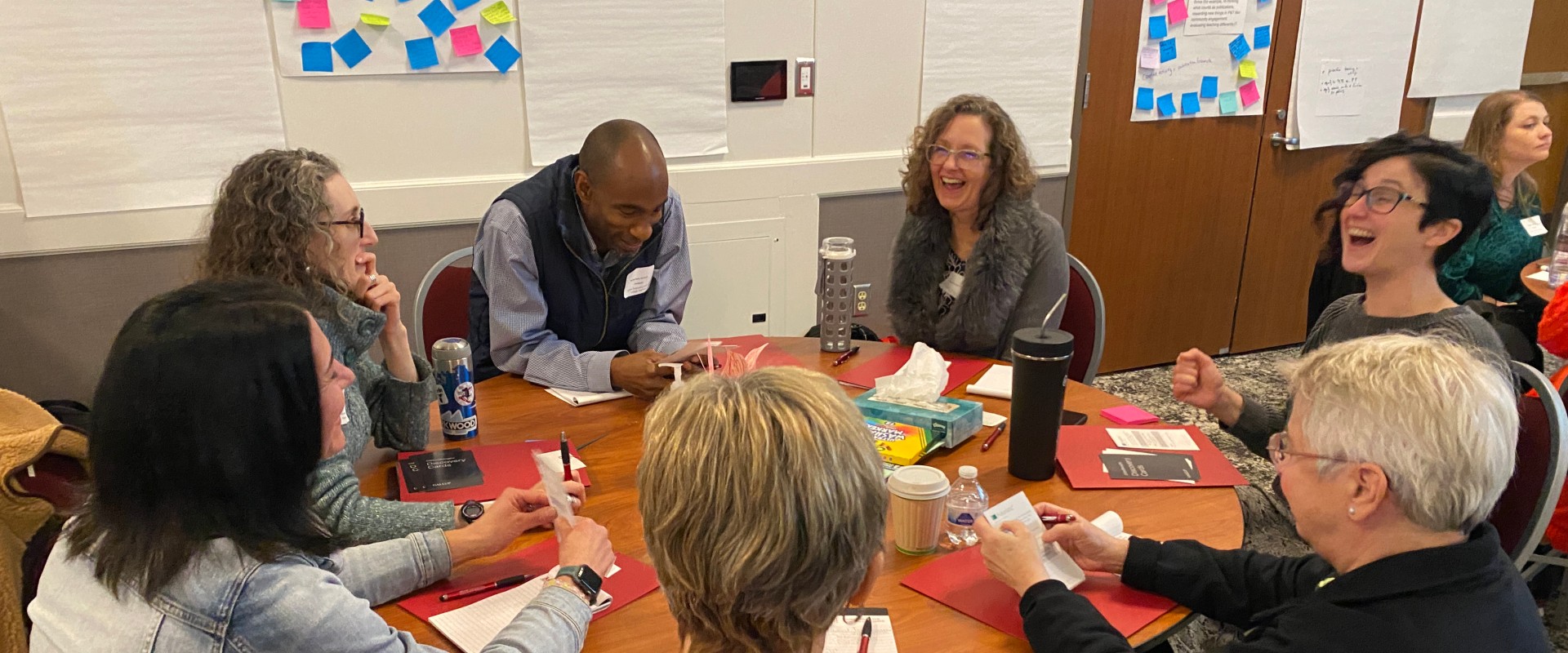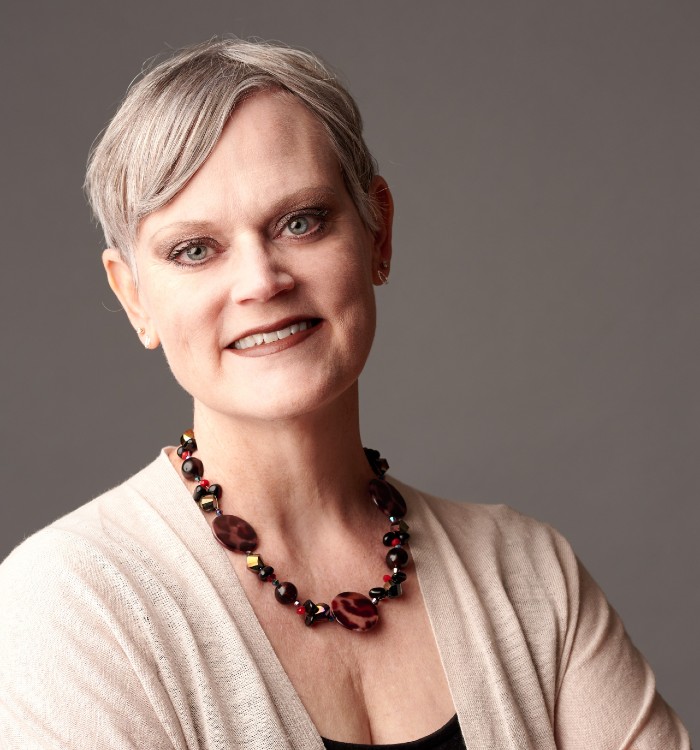
Sensemaking for Student Success: A Cohort-Based Faculty Change Method
A Change Program for Institutions of Higher Education
The challenges facing higher education require leveraging faculty expertise and making system change, rather than focusing on individual classrooms.
Sensemaking for Student Success was piloted at the Howe Center for Writing Excellence beginning in 2017 through the Faculty Writing Fellows program. Over 190 faculty members so far have worked together across time to imagine new ways to attract, engage and retain students, and design programs for deep and supported learning. In 2021, a large community college system adopted the method across their 10-college system in Arizona. And in Summer 2024, Lumina Foundation funded a pilot to expand the method for teams of faculty from colleges and universities across Ohio. Now the method is available to you!
About the Program
What Is Sensemaking for Student Success?
The program was developed and launched in 2017 by Dr. Elizabeth Wardle, Roger & Joyce Howe Distinguished Professor of Written Communication and Director of the Howe Center for Writing Excellence at Miami University. 177 faculty members from over 30 disciplines have completed the program at Miami (where it is called the “Howe Faculty Fellows Program”). In 2021, the program expanded to the 10-institution Maricopa Community College system in Arizona (where it is called the “Literacy Partners Program”).
At its core, the sensemaking method, as initially developed by Dr. Wardle, engages teams of faculty from within and across disciplines in naming problems they want to solve; engaging research and theory about threshold concepts, learning, and equity; and then imagining solutions to the problems they name. It is a carefully scaffolded program that engages faculty with scholarship while respecting their experiences and expertise in order to create conditions for collaboration across silos. The combination of scholarship and guided activities to leverage faculty expertise enables faculty to work together to solve hard and systemic problems. This combination of scholarship, activities, and grassroots team problem-solving of systemic problems across time sets this method apart from other faculty development methods such as workshops, webinars, faculty learning communities, and reading groups.
The sensemaking program proceeds from these principles:
- Every problem that programs, divisions, and higher ed as whole face can best be approached as intellectual/scholarly opportunities, not bureaucratic tasks.
- Faculty members’ disciplinary expertise is central to higher ed’s ability to innovate and solve problems.
- Leveraging faculty expertise for problem-solving requires designing opportunities to engage in intentional scholarly sensemaking.
- Faculty must engage as teams and across silos with other members of the institution in order to meaningfully solve problems.
- The problems higher education faces need to be resolved with speed but not haste, considering principles for action and long-term consequences of decisions.
- The systems we have inherited are changeable, but changing them requires leveraging the expertise of all members of the institution.
- Access, equity and inclusion for deep learning must be central to any future vision for higher ed.
The sensemaking method, as implemented at Miami and Maricopa, helps teams of faculty members leverage their collective expertise in order to solve problems related to teaching and learning and innovate new programs and pedagogies for higher education. Together, the faculty who have engaged in the program have taken up problems such as:
- Intro courses are serving an unintentional gatekeeping function for some students and have not changed in decades.
- New general education requirements within the institution and changing faculty in a program require new approaches to gateway or capstone general education courses taught within a particular discipline or across related disciplines.
- Enrollment in a major is low and the curriculum for the major needs to change, with a coherent approach agreed on by all faculty. However, the faculty have not discussed their shared values and commitments or named their fied’s threshold concepts, making any curricular change challenging.
- Faculty within a program are unaware of the assignments being given and skills being taught in other courses in the major.
- Assessments have not been meaningful and little is known about student needs or outcomes of faculty pedagogies.
- How AI is changing professions, and implications for the curriculum
- Traditional assignments and genres are not helping students learn threshold concepts that are transferable to other contexts.
- High reliance on part-time labor in a department that teaches large numbers of lower-level general education courses requires re-imagining how the department’s values and pedagogies can be shared with new instructors.
- Faculty from multiple disciplines teach in a shared interdisciplinary program but have no extended opportunities to think together about their curriculum.
- High-impact practices like e-portfolios can reinvigorate programs, but faculty need time to learn and study them together, and support for implementation.
- Curricula are not coherent and students experience “whiplash” as they move from one disconnected course to another.
Commit to Change At Your Institution
Learn More About the Sensemaking Method, Its Methods, and Its Impacts
What is Sensemaking?
The Sensemaking Method
Sensemaking Testimonials
Leveraging Faculty as Internal Consultants
More Resources
- Changing Conceptions, Changing Practices: Innovating Teaching Across Disciplines.
- Writing Expertise: A Research-Based Approach to Writing and Learning Across Disciplines.
- “Working with Faculty Partners to Change Conceptions of Writing Beyond University Walls.” WAC Journal, March 2023.
- “ ‘Something Invisible… Has Been Made Visible for Me’: An Expertise-Based WAC Seminar Model Grounded in Theory and (Cross) Disciplinary Dialogue.” In Diverse Approaches to Teaching, Learning, and Writing Across the Curriculum: IWAC at 25.
- “Extending the Howe Model to 2-Year Schools: Maricopa Community College System Pilots Faculty Writing Fellows Program.”
- “Why People Can’t Write, and How to Fix That.” Build For Tomorrow Podcast. January 2022.
- “You Know More Than You Think about Teaching Writing.” Inside Higher Ed. January 31, 2019.

Questions? Contact Dr. Elizabeth Wardle
139B King LibraryHowe Center for Writing Excellence, Miami University
Oxford, OH 45056 wardleea@MiamiOH.edu 513-529-6210